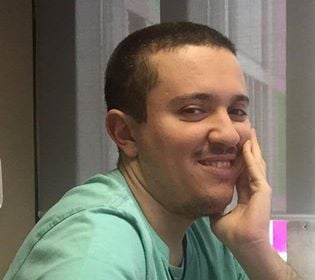I have been reading the work of Rene Girard now for a quarter century and have been applying the insights of the mimetic theory to the Bible and Christian theology for all that time. Girard is not a theologian but he has provided us with an anthropology, a way of understanding the human and human culture that explains so much of the data from so many sciences that its insights have become conclusive for me (or at least as conclusive as one can admit to in our postmodern world).
In mimetic theory, both religion and culture originate from the same place: the generative mimetic scapegoating mechanism (as Robert Hamerton-Kelly so aptly named it). As humans evolved and became more and more violent, in order to stop groups from total collapse, humans learned to turn their collective hostilities onto a single victim, thus temporarily securing ‘peace’ through cannibalistic cooperation. This cooperation is the ground for culture and the ritualizing of this mechanism is the ground of religion.
Religion is widely criticized, vilified and condemned in the world today. It is easy to see why. The interface between religion and war, politics, money and power (in other words, human culture), leaves us feeling uneasy or angry, frightened or dystopian. From ISIS in the Mid-East to the flag waving rallies of American Christianity, all around the world we see the ever present specter of a god who devours humanity, of a god who hates the other. We start and fight wars for this god, we behead others for this god, we send others to concentration and labor camps in the name of this god and we have secularized this god in the form of the modern nation-state. There is only one god in this world and its name is Violence and Death.
The god of this world is Violence and Death. At least that is how Jesus understood it and named it. This god can only deceive and destroy. It hides behind masks of propaganda, its illusions blind the eyes and minds of billions, its all consuming power has created fear to such a degree that uneasiness, anxiety and depression have become our common lot. This god has no interest other than itself, keeping itself in power and the wholesale slaughter of the human species and the planet on which we dwell. This is a god made completely in our own image. We fear ourselves. Or as Walt Kelly had Porky Pine say, “We have met the enemy, and he is us.”
Religion is, from the perspective of Girard, both a blessing and a bane. It was a blessing (if one can call it that), for without it the human species would not have evolved, we would simply have wiped ourselves off the planet eons ago. It is a bane for by it we have constructed a mechanism that takes life, justifies the taking of life, and continues to take life while building our little empires all around the planet.
It is this mechanism that the Gospel exposes, it is this hopeless matrix that is called into question and trumped by the Passion of Jesus Christ.
This Gospel, this good news of an alternate reality, of a vision of what it means to be fully and truly human, was planted over 2,000 years ago on a hill outside Jerusalem. Two things happened shortly thereafter. One group of Jesus’ followers would begin the process of merging Jesus and his vision of God’s reign back into the matrix of sacred violence, sacrifice, holiness codes and us/them thinking. Another group saw the implications of this sacred violence and would conclude that the Cross of Christ was the eradication of all us/them logic and that Here, in this horrid event, God pronounced forgiveness for the entire human species, no exceptions. This latter message of Paul and the writers of the Fourth Gospel, of Mark, Luke and to a great extent Hebrews, would begin to permeate the world. However, after time it too became enfolded within the other sacrificial trajectory of the Jerusalem church and for the next 1,900 years we have had this thing called Christianity.
The Gospel is not religion, it cannot be the basis for a religion. But it had become one. The sacred scriptures which were canonized contained both trajectories, sacrificial and non-sacrificial. When one reads the early writers of the church one can see them all wrestling with these two opposing ways of thought. Both trajectories would be canonized within the Christian New Testament just as they had been canonized within the Jewish Tanakh. It should come as no surprise therefore that the theologians that followed this process of the canonization of both trajectories, beginning with Augustine in the West, would create that artifice we know as Christendom.
It is well nigh impossible to consider the development of human civilization apart from the Christian religion. Christianity has contributed in remarkable ways (as have the other two ‘religions of the book’ Judaism and Islam) to the rise of civilization, science and the arts as we know them. However, within Christianity lay a message that God was united with a human corpse (to use the phrase of Alan Lewis). This God, not of this world, had identified with the victim of a sacrificial process, and in so doing, had united God’s very self with all victims of sacrificial processes beginning from Abel. The message of Christianity has always somehow been about this God, who on that ugly Black Friday, did the inconceivable: this God changed the course of human destiny from perdition to blessing.
Here we are, 2,000 years down the road. We are living on a post-Holocaust planet. We know all about victims. We have become hyper-sensitized to the injustice of those who victimize others and we are just beginning to see how we also participate in victimizing others from a personal to a corporate or national scale. Our eyes are being opened. We live in the time of a Great Awakening.
Not an awakening to religion or religious experience but to a dawning that we perpetuate Calvary every day on the streets of Ferguson, MO, New York City, London, Moscow, Mumbai. It is the power of that seed planted some 2,000 years ago that is creating for us the awareness that we cannot keep burying human bodies in the ground hoping to reap the fruits of peace and harmony. We are awakening to the fact that we have sown a harvest of blood, blood which seeks vengeance and retribution. We have been sowing a zombie apocalypse of our own making. And religion has been the CEO of these operations, including the Christian religion.
That singular insight, namely, that the very ‘religion’ which was about triumphing over sacred violence, had become married to such horror has been the undoing of Christianity as we know it. The Gospel message, buried deep in the theological dungeons of Christendom, has broken free and is wildly running around the landscape of human consciousness proclaiming that “God is free and not like we think.” It is this free and radically loving, merciful and compassionate God, the One who at Calvary pronounced forgiveness as the solution to human violence and who brought home that message with eschatological power in the Shalom announcement of the risen Forgiving Victim, that has opened the eyes of our hearts, our minds and our imaginations.
We cannot just throw out religion. That would be like cutting out our heart. But we can seek for the transformation of religion just as stone hearts can be changed and transformed.
What Christianity will look like in 20, 50 or 100 years is impossible to say. But, during this time of awakening, Christians cannot afford to throw any more babies out with the bath water. Yes, we can, may and ought to critique the churches and their theologies when they participate in illusion, delusion, death and destruction. Yes, we must, can and should find ways to articulate this gospel message in all our cultures and break down the barriers religion has erected between us and them. But it is sheer folly to think we can walk away from our past and begin as though we had no genetic connections to that past.
Yes, we live in a time where the gospel has been doing its deconstructive work for 2,000 years. We are the ones witnessing the fall of the walls. It is both frightening and liberating at the same time. The sound and fury of the deconstruction of religion and culture means that the reign of the old gods, the gods of war, violence, destruction and power and death has ended. We hear these gods gasping in their death rattles. Their breath is short, their wounds are mortal. Our world is changing.
We live between memory and hope. We have just entered a season of hope, Advent, where we await the new thing which will save us. We await that moment where in memory and in hope, God is enfleshed in our humanity. The memory of the birth of Jesus Christ is about that hope. May we learn to let our religion go, blessing her on her way as she transforms from this age to the age to come. May Jesus Christ be born in her, in each of us, in all of us. May we learn to dwell in the peace that is God.










